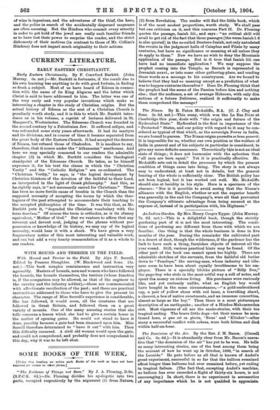EARLY EASTERN CHRISTIANITY.
Early Eastern Christianity. By F. Crawford Burkitt. (John Murray. 6s. net.)—Mr. Burkitt is fortunate, if the result due to his own learning has anything to do with good fortune, in finding so fresh a subject. Most of us have heard of Edessa in connec- tion with the name of its King Abgarus and the letter which Christ is said to have addressed to him. The letter was one of the very early and very popular inventions which make so interesting a chapter in the study of Christian origins. But the actual history of Edema as the seat of a Christian Church is peculiarly worth study, and it is this to which Mr. Burkitt intro- duces us in his volume, a reprint of lectures delivered in St. Margaret's, Westminster. The Edessene Church was founded in the second century by a Palestinian Jew. It suffered eclipse, and was refounded some sixty years afterwards. It had its martyrs and its divisions, and in course of time it became separated from the great body of the Eastern Church. It had accepted the decrees - of Nicaea, but refused those of Chalcedon. It is needless to say,
• therefore, that it comes under the " Athanasian" anathemas. And here we may specially commend to our readers the admirable chapter (3) in which Mr. Burkitt considers the theological standpoint of the Edessene Church. He takes, as he himself • expresses it, for his text the clause in which the "Christian Verity" and the "Catholic Religion" are co-ordinated. The " Christian Verity," he says, is "the logical development by Christian thinkers of the devotion of the faithful to their Lord,
• as interpreted in the light of Greek philosophy." And this, as luNrightly says, is "not necessarily sacred for Christians." There has been no more fertile cause of trouble in the Church than the supposed neceasity of accepting the terms by which the theo- logians of the past attempted to accommodate their teaching to the accepted philosophies of the time. It was this that, as Mr. Burkitt puts it, "degraded the Christian vocabulary with the term OECITOXOS." Of course the term is orthodox, as is its clumsy equivalent, "Mother of God." But we venture to affirm that any reverent and devout soul, judging of the phrase without pre- possession or knowledge of its history, we may say of its logical necessity, would hear it with a shock. We have given a very fragmentary notice of this most interesting and valuable work, and can but add a very hearty commendation of it as a whole to our readers.
WITH HOUND AND TERRIER IN THE FIELD.










































 Previous page
Previous page